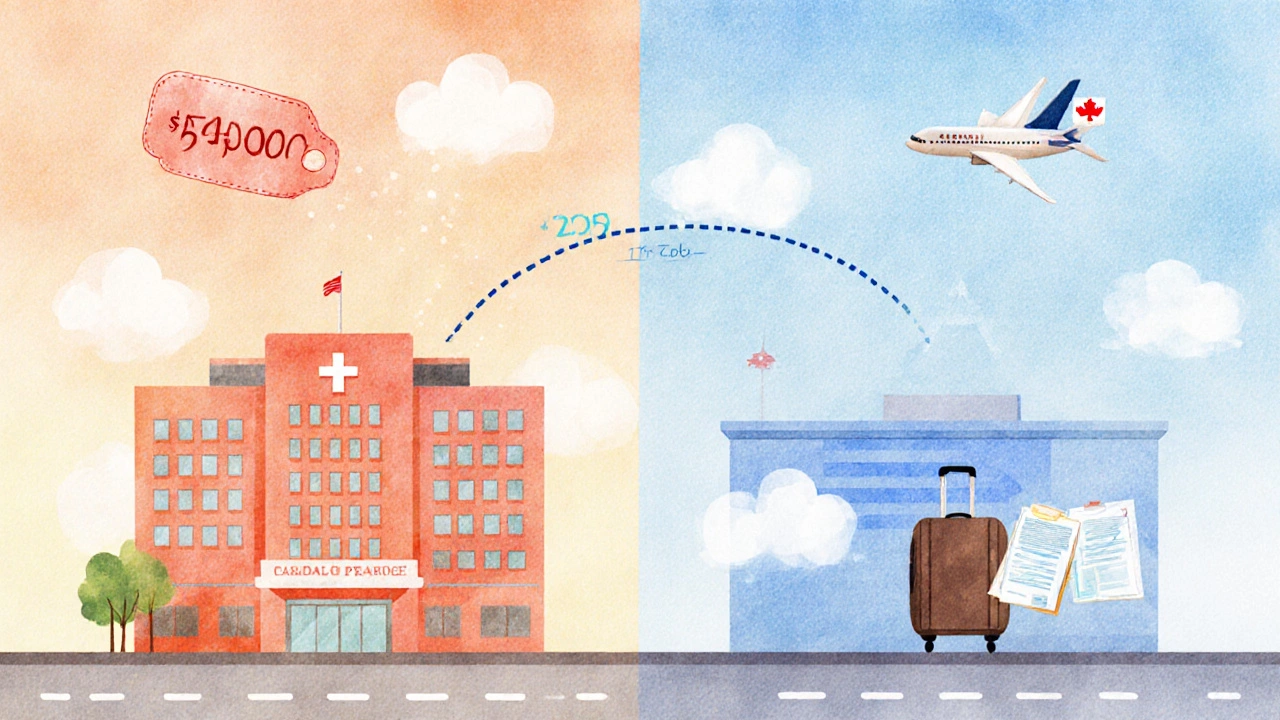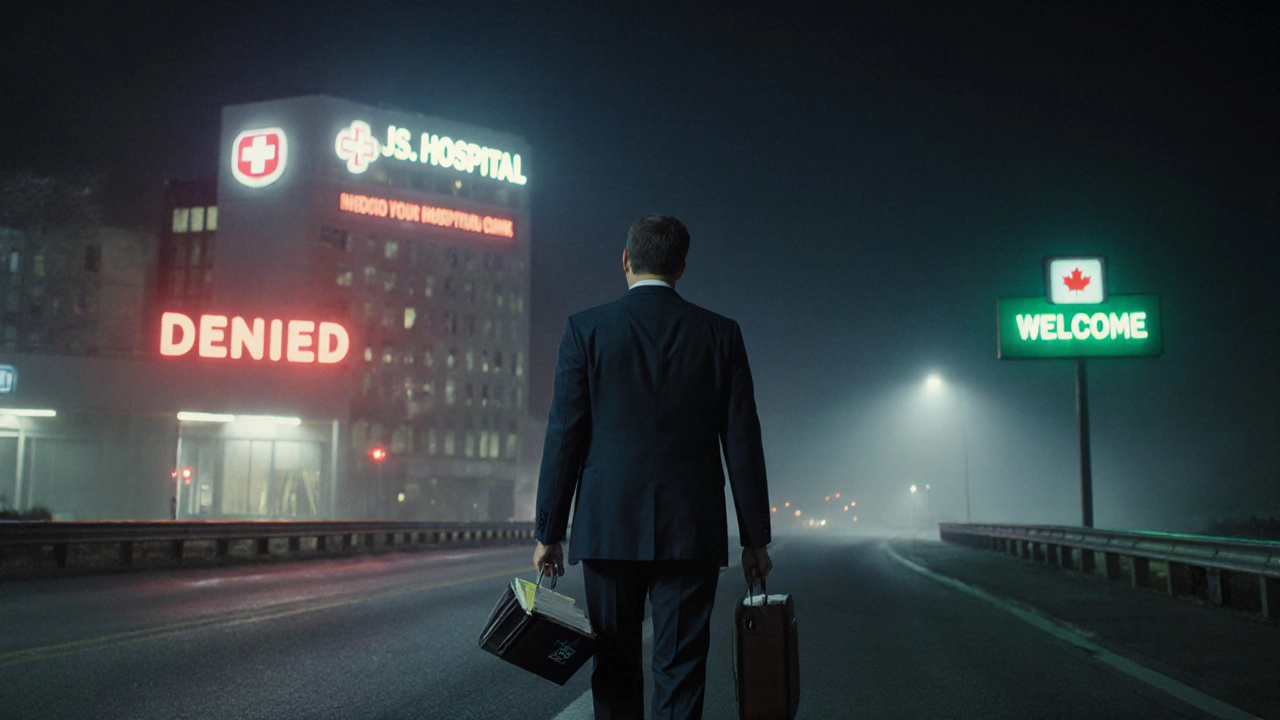Medical Cost Comparison Calculator
Cost Comparison Results
Important Note: These are approximate costs for private clinics serving international patients.
Most U.S. insurance plans don't cover care in Canada. Always verify with your insurer before traveling.
Disclaimer: Costs are based on average prices for private clinics serving international patients in Canada. Actual costs may vary depending on location, provider, and specific circumstances.
Can an American see a doctor in Canada? Yes-but not the way most people assume. You won’t walk into a clinic in Toronto or Vancouver and get free care just because you’re from the U.S. Canada’s healthcare system isn’t open to tourists or visitors without coverage. But that doesn’t mean you can’t get treated. Millions of Americans cross the border every year for medical care, and many find it cheaper, faster, or more convenient than staying home.
How Canadian Healthcare Actually Works for Foreigners
Canada’s public healthcare system, funded by taxes, only covers Canadian citizens and permanent residents. If you’re an American visiting Canada, you’re considered a foreign visitor. That means any doctor visit, lab test, or hospital stay will cost you out of pocket. There’s no magic pass, no hidden access, no emergency exception that gives you free care.That doesn’t mean you’re stuck. Many Americans go to Canada specifically because they can pay less for the same services. A knee replacement that costs $35,000 in the U.S. might run $15,000 in Ontario. An MRI in New York could be $1,200. In Calgary, it’s $450. Dental work? Even bigger savings. A crown in the U.S. averages $1,300. In Canada, it’s $600-$800.
But here’s the catch: you pay upfront. Canadian clinics don’t bill U.S. insurance companies. You’ll need to pay in full at the time of service-cash, credit card, or bank transfer. Then you file a claim with your own insurer back home, if your plan covers out-of-network or international care.
What Medical Services Can Americans Get in Canada?
Americans travel to Canada for a wide range of treatments, especially when they face long wait times, high costs, or lack of coverage back home.- Elective surgeries: Hip and knee replacements, cataract removal, and spinal surgeries are common. Wait times in Canada for these can be months, but private clinics (which serve foreigners) often schedule you within weeks.
- Dental care: Crowns, implants, and full-mouth reconstructions are popular. Many U.S. patients combine a dental trip with a vacation in British Columbia or Quebec.
- Diagnostic imaging: MRIs, CT scans, and ultrasounds are significantly cheaper. Some Americans fly in just for a scan, then return home to discuss results with their local doctor.
- Specialist consultations: If you need a second opinion from a top Canadian oncologist or neurologist, many clinics offer telehealth or in-person visits for international patients.
- Weight loss surgery: Gastric bypass and sleeve gastrectomy are offered at a fraction of U.S. prices, with high success rates.
Canada doesn’t offer experimental treatments or unapproved drugs. If you’re looking for stem cell therapies or cutting-edge cancer protocols not cleared by the FDA, you won’t find them in Canada either. The country follows strict regulatory standards, which means fewer scams-but also fewer unproven options.
How to Find a Doctor or Clinic That Sees Americans
Not every clinic in Canada accepts foreign patients. Some only work with the public system. Others specialize in medical tourism.Start by searching for private clinics that advertise services for international patients. Look for terms like:
- “International Patient Services”
- “Medical Tourism Canada”
- “For U.S. Patients”
Major cities like Toronto, Vancouver, Montreal, and Calgary have dedicated medical tourism offices. Some hospitals even have international patient coordinators. For example, the Mount Sinai Hospital in Toronto has a Global Health Program that helps Americans book appointments, arrange travel, and translate medical records.
Always verify credentials. Check if the doctor is licensed by the College of Physicians and Surgeons in their province. You can search their name on the college’s public registry. Avoid clinics that pressure you to pay immediately or refuse to give you itemized bills.

What About Insurance? Will Your U.S. Plan Cover It?
Most U.S. health insurance plans don’t automatically cover care in Canada. Medicare? No. Medicaid? No. Most employer plans? Maybe-if you have out-of-network benefits.Here’s how to find out:
- Call your insurer. Ask: “Do I have out-of-network benefits for medical services in Canada?”
- Ask if they require pre-authorization.
- Request a list of approved providers abroad (very few do).
- Ask how claims are processed. Do you pay first and get reimbursed? Or do they pay the provider directly?
Many Americans buy international medical travel insurance before going. These policies cover emergency care, complications, and sometimes even elective procedures. Brands like GeoBlue, Allianz Travel Insurance, and IMG offer plans tailored for medical tourism.
Don’t assume your regular travel insurance covers medical treatment. Most only cover accidents or emergencies-not planned surgeries.
Cost Comparison: U.S. vs. Canada (2025)
| Procedure | U.S. Average Cost | Canada Private Clinic Cost | Savings |
|---|---|---|---|
| Knee Replacement | $35,000 | $15,000 | 57% |
| Hip Replacement | $32,000 | $14,000 | 56% |
| MR Scan | $1,200 | $450 | 63% |
| CT Scan | $1,100 | $380 | 65% |
| Dental Crown | $1,300 | $700 | 46% |
| Gastric Bypass | $25,000 | $12,500 | 50% |
| Eye Cataract Surgery | $3,800 | $1,800 | 53% |
These prices are for private clinics that serve international patients. Public hospitals in Canada may have longer wait times, even for foreigners. Most Americans go to private clinics to avoid delays.
What Could Go Wrong? Risks and Pitfalls
Medical tourism isn’t risk-free. Here’s what you need to watch out for:- No follow-up care: If you have complications after returning home, your U.S. doctor may not have your records or may refuse to treat you because the procedure was done abroad.
- Language barriers: While most Canadian doctors speak English, administrative staff might not. Always ask for written summaries of your treatment.
- Hidden fees: Some clinics advertise low prices but add costs for anesthesia, hospital stays, or medications. Get a full itemized quote before you pay.
- Travel risks: Flying soon after surgery increases the risk of blood clots. Wait at least 7-10 days after major surgery before flying.
- Legal protection: If something goes wrong, you can’t sue a Canadian clinic in a U.S. court. Canadian medical malpractice laws are different. Always sign a clear consent form.
Many Americans choose Canada because it’s close, culturally familiar, and has high standards. But you still need to treat it like any major medical decision-do your research, get second opinions, and plan for recovery.

Real Stories: What Americans Say
A 62-year-old from Ohio had a knee replacement in Toronto after his U.S. insurer denied coverage. He paid $14,500 out of pocket. His U.S. insurance reimbursed him $7,200 after he submitted receipts. He was walking without pain within six weeks. A couple from Texas flew to Vancouver for dental implants. They spent $18,000 total-$12,000 less than what they were quoted in Dallas. They stayed for 10 days, toured the city, and returned with a full smile and $2,000 left over from their travel budget. These aren’t rare cases. Thousands of Americans do this every year. It’s not about avoiding U.S. healthcare-it’s about finding better value when the system fails you.What You Need to Bring
Before you cross the border:- Your passport and visa (if required-most Americans don’t need one for short stays)
- Proof of medical travel insurance
- Full medical records, including imaging and lab results
- Written list of medications and allergies
- Payment method (credit card preferred)
- Contact info for your U.S. doctor
Don’t forget to check the Government of Canada website for current entry rules. Some provinces require proof of vaccination or health declarations.
Final Thoughts: Is It Worth It?
Yes-if you’re prepared. Canada offers high-quality care at lower prices, with no language barrier and minimal cultural shock. It’s not a loophole. It’s a practical option for Americans priced out of their own system.Don’t go just because it’s cheaper. Go because you’ve done the homework: you’ve compared costs, verified credentials, secured insurance, and planned for recovery. The savings are real. The quality is there. But you still need to be smart.
Can an American get free healthcare in Canada?
No. Canada’s public healthcare system only covers citizens and permanent residents. Americans must pay out of pocket for all services, even in emergencies. There are no exceptions.
Do U.S. insurance plans cover care in Canada?
Most don’t. Medicare and Medicaid never do. Some private insurers offer out-of-network benefits, but you’ll likely need to pay first and submit receipts for reimbursement. Always call your insurer before booking anything.
Is it safe to get surgery in Canada as an American?
Yes-if you choose a licensed private clinic. Canadian doctors are highly trained, and the country has strict medical standards. Check the doctor’s license through the provincial College of Physicians and Surgeons. Avoid clinics that push you to pay upfront without contracts or records.
How long do I need to stay in Canada after surgery?
It depends on the procedure. For minor surgeries like cataracts or dental work, 3-5 days is enough. For major surgeries like joint replacements or gastric bypass, plan for 10-14 days to allow for initial recovery and follow-up checks. Flying too soon increases the risk of blood clots.
Can I use my U.S. prescription in Canada?
Not directly. Canadian pharmacies require a prescription from a Canadian-licensed doctor. If you need medication while there, you’ll need to see a local doctor for a new script. Bring your U.S. prescription as reference, but don’t assume it will be honored.
What if I have a medical emergency in Canada?
Go to the nearest hospital. Emergency rooms will treat you regardless of citizenship. But you’ll be billed. Don’t assume it’s free. Always have travel insurance that covers emergency care abroad.
Are Canadian doctors as good as U.S. doctors?
Yes. Canadian doctors train at top universities, pass rigorous licensing exams, and follow the same evidence-based standards as U.S. physicians. Many U.S. doctors even send their own patients to Canada for specialized care because of lower wait times and costs.
Do I need a visa to go to Canada for medical treatment?
Most U.S. citizens don’t need a visa for stays under 180 days. You’ll need a valid passport and may be asked to show proof of ties to the U.S. (like a job or home) and proof of funds to cover your medical care. Always check the official Government of Canada website before you travel.
